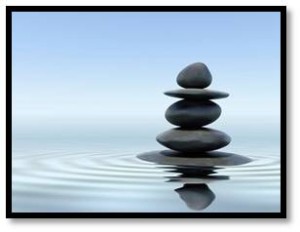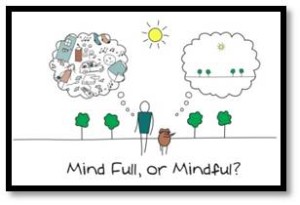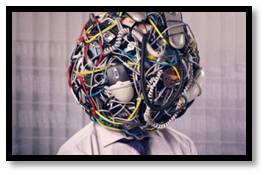Monday Author: Susanne Skinner
 I am learning to meditate — again. I have tried this before without much success. My mind wanders, I have trouble sitting still, and once I do manage to focus, something starts to itch or my stomach rumbles. For some this transcendence comes easily, for me it is hard work.
I am learning to meditate — again. I have tried this before without much success. My mind wanders, I have trouble sitting still, and once I do manage to focus, something starts to itch or my stomach rumbles. For some this transcendence comes easily, for me it is hard work.
My renewed interest in this practice is twofold. First, it is a proven holistic approach to handling stress and letting go of things we cannot change. I want to begin and end each day centered and at peace with myself and my surroundings. I want to lessen and eventually remove the unnecessary stress I create for myself.
I am at the age when things like blood pressure, blood sugar and restful sleep become topics of discussion at the annual physical. It adds a layer of stress and introduces prescriptive solutions where none were required before. This is not the path I want to follow. I would much rather learn how to holistically encourage mental and physical well-being. I am not opposed to western medicine, but I think a lot of prescriptions are written before other options are considered.
I am committed to incorporating mindfulness into my daily routine and managing the voices inside my head. What brings me to this place is the desire to simplify life by not looking forward or behind me; instead learning to be only in the present. It is being rather than doing, which benefits mind and body.
The second part of my inspiration is a man named Jon Kabat-Zinn. I like this guy. He’s not a 60s flower child preaching Zen, he’s an MIT graduate in molecular science and professor emeritus at the University of Massachusetts Medical School. He is also a long-time student of spiritual leader and Buddhist monk Thich Nhat Hahn, whose writings have influenced me for many years.
East Meets West
Kabat-Zinn has good cred. In 1979 he founded the Stress Reduction Clinic at the University of Massachusetts Medical School, bringing the ancient healing practices of meditation and yoga together to promote unity between the spiritual and physical elements of our being. He developed a course called Mindfulness-Based Stress Reduction (MBSR) bringing these practices into the mainstream of our western culture. He has helped me recognize the importance of this harmony with a lot of evidence to back it up.
 In the spirit of honest blogging, I admit I am wary of practices that are shrouded in mysticism — I never feel at home there and need at least a small measure of science to anchor the belief that they will be of value to me. I am Type A by nature so if I understand the logic along with the philosophical connections between the emotional, physical and spiritual I have a better chance of success.
In the spirit of honest blogging, I admit I am wary of practices that are shrouded in mysticism — I never feel at home there and need at least a small measure of science to anchor the belief that they will be of value to me. I am Type A by nature so if I understand the logic along with the philosophical connections between the emotional, physical and spiritual I have a better chance of success.
Mind Full or Mindful?
“Bring awareness to what the impulse is that’s bringing you to meditation in the first place and therein lies everything you need to know. Keep paying attention to that, love it, and see what happens. And keep it simple.” — Jon Kabat-Zinn
Mindfulness is another word for awareness. It is being present; to ourselves and our surroundings. Our lives are cluttered with distractions and this is a way to filter them out and pay attention to the now. It’s the filtering out part that challenges me. When I say I am wired, I am telling the truth. I am too absorbed by things that have happened, have yet to happen, and might never happen. They live inside my head (rent free) and place too much stress on all the other parts of me.
Learning to empty my mind and give myself permission to think only of the immediate moment is hard work. My mind is always full; I must learn to reprogram myself to be less concerned about things past and future and that is no small task.
I’m integrating a yoga class into my routine as Kabat-Zinn suggests, training my mind and body at the same time. I have done yoga before and evening classes are offered in my town.
I am committed to good health, practice healthy cooking and eating and include exercise in each day. I belong to a wonderful walking group and the ladies and I hit the road every morning for an hour-long power walk and group therapy session. But I know there is a missing piece, and I am walking this path with the belief that I will connect with it in meditation and yoga.
Disconnecting
The older I get, the less technology I want. Unfortunately I work in the high tech industry and we live and die in the cloud. That said; a measure of this commitment  is to disconnect when not at work. This is not difficult—I have a manager who respects the concept of weekends and holidays. My company is also unusual in that we have no vacation policy—you take it when you need it. Nobody abuses it, people take time to relax and recharge, and we are all productive employees.
is to disconnect when not at work. This is not difficult—I have a manager who respects the concept of weekends and holidays. My company is also unusual in that we have no vacation policy—you take it when you need it. Nobody abuses it, people take time to relax and recharge, and we are all productive employees.
Cell phones and computers are not going away but use of them as a convenience is different that allowing them to govern your life. That sentence was written by a woman who had a Blackberry surgically implanted in her left hand four years ago. Removing it is one of the most liberating things I’ve done.
As I travel this road it is my goal to keep removing things that inhibit enjoyment of this perfect day. I am open to possibility and will write a follow up blog at the end of the year to share my progress.
It is always now.
